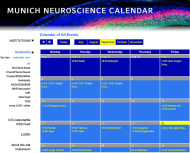How the Center was Formed
 The university’s initiative LMUinnovativ led to the formation of the Munich Center for Neurosciences (MCN) in 2005. As a major outcome thereof, the attraction of third party funding (joint grants ~60 million, 2007 – 2011) was facilitated by being able to resort to an extensive group of excellent researchers brought together within the framework of the MCN and associated research entities. Significant amounts of research funding were drawn from federal sources (Bundesministerium für Bildung und Forschung, Deutsche Forschungsgemeinschaft), Bavarian-wide initiatives (Elite Network of Bavaria), as well as private organizations and industry (AMGEN). Successful research initiatives that were substantially supported by the Center range from fundamental research on neuronal circuits (Collaborative Research Center 870) to theoretical and computational neurosciences (Bernstein Center for Computational Neuroscience Munich). Beyond the circuit level, the center’s focus is also set on research of cognitive processes. The huge potential for translating results from research into tangible applications becomes evident by successful initiatives applying research to technical systems (Excellence Cluster Cognition for Technical Systems). This holds especially true for those initiatives applying top-notch scientific results directly to the benefit of patients, i.e. within centers that integrate research and treatment (e.g. Integrated Center for Research and Treatment of Vertigo, Systems Neurology Cluster Initiative).
The university’s initiative LMUinnovativ led to the formation of the Munich Center for Neurosciences (MCN) in 2005. As a major outcome thereof, the attraction of third party funding (joint grants ~60 million, 2007 – 2011) was facilitated by being able to resort to an extensive group of excellent researchers brought together within the framework of the MCN and associated research entities. Significant amounts of research funding were drawn from federal sources (Bundesministerium für Bildung und Forschung, Deutsche Forschungsgemeinschaft), Bavarian-wide initiatives (Elite Network of Bavaria), as well as private organizations and industry (AMGEN). Successful research initiatives that were substantially supported by the Center range from fundamental research on neuronal circuits (Collaborative Research Center 870) to theoretical and computational neurosciences (Bernstein Center for Computational Neuroscience Munich). Beyond the circuit level, the center’s focus is also set on research of cognitive processes. The huge potential for translating results from research into tangible applications becomes evident by successful initiatives applying research to technical systems (Excellence Cluster Cognition for Technical Systems). This holds especially true for those initiatives applying top-notch scientific results directly to the benefit of patients, i.e. within centers that integrate research and treatment (e.g. Integrated Center for Research and Treatment of Vertigo, Systems Neurology Cluster Initiative).
These initiatives also have substantial influence on society’s perception of neurosciences and help in forging a general consensus that neuroscience research is critical for a healthy development of our society in the future. A number of initiatives continually put Munich as a center for neurosciences on the screen of local, national, and international neuroscientists. For instance, more than 40 well-recognized researchers have been invited to participate in the prestigious MCN Monday Lecture Series, which has been held since 2007. Other events, like the envisaged Christmas Lecture in collaboration with the Bavarian Ministry of Science, Research and the Arts further strengthened the center’s public outreach activities. In order to cover that increasingly important field of public relations, a PR coordinator and IT staff were funded by the MCN, aiming the implementation of modern means of internal and external communication. A major goal of the center has been the creation of an efficient communication structure to promote scientific interaction within the MCN and across its affiliated research institutions.
One of the main strengths of the center is that it combines cutting-edge research from world-class scientists with a wide range of teaching measures that cumulate in the Graduate School of Systemic Neurosciences (GSN-LMU). Here neuroscience teaching from B.Sc. to Ph.D. is provided in a well-structured form that undergoes continuous evaluation. Teaching within the GSN is complemented by undergraduate programs like the Amgen Scholars Programme, which provides research insights to top international students at an early stage. While these initiatives potentially scout for well-educated bachelor students from abroad, other complementary MCN initiatives for advanced Ph.D. students and postdocs (such as the Harvard-LMU Young Scientists' Forum and the QBI-MCN Symposium) aim to promote an exchange of young scientists with other excellent neuroscience institutions around the world.


